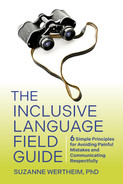 ACKNOWLEDGMENTS
ACKNOWLEDGMENTS 
AS I WROTE THIS BOOK, I worked hard to incorporate the Six Principles of Inclusive Language into the text itself. My biggest goal for this book was that it reflect reality and show people new ways of understanding how language works in context. But I also wanted to make sure that the book showed respect to all different kinds of readers, drew all of them in, and didn’t inadvertently erase anybody. To do that, I had to incorporate different perspectives and make sure I was recognizing and avoiding pain points for different people.
So I needed input from a whole lot of people to make sure that the text wasn’t problematic.
I am grateful to the many people who shared their expertise with me and reviewed different components of this book. Dr. Jon Henner gave guidance and insight for Deaf inclusion along with other aspects of disability, ableism, and exclusion. I’m also grateful to disability expert Jessie Wusthoff, who reviewed and improved the disability-related content in this book (and who introduced me to the fantastic Lesa Bradshaw TEDx talk that I excerpt in Chapter 4). Ayden Parrish and Rachel Cullen were absolutely crucial to the creation and refinement of text relating to autistic people. And Dr. Kirby Conrod made sure my descriptions of gender and pronoun usage were up to the mark.
I’d also like to thank the people who reviewed the book from the perspective of their own lived experience and guided me to improvements so readers of all kinds would feel acknowledged and welcomed by the text. Cynthia Overton, Bryan Banisaba, Calysta Watson, Nimkiins MikZaabii (Dmetri Hayes), and Jared Boyce—thank you!
My agent, John Willig, was insightful enough to bring me to Berrett-Koehler, my publisher, which has “improving the world” at the heart of its business model—to the point where it is actually a certified B Corp, which makes Berrett-Koehler my kind of publisher. My in-house editors Neal Maillet and Sarah Modlin were integral in reshaping my original proposal—which I will kindly call “completist” but might also be described as “way too big” and “no one will buy or read the book in this format.” Their insights and guidance throughout the process helped turn the book into what it is today. And I am eternally grateful to my fantastic developmental editor, Susan Defreitas. Not only did our sessions keep me on schedule (literally getting words on the page can be one of the hardest parts of writing), but her feedback and suggestions were invaluable for restructuring chapters, removing the “linguistic digressions” I really wanted to share but would maybe be a lot less compelling for readers, and rephrasing sentences so they were as clean (and empathetic) as possible.
It takes a lot to write a book—and even though I’d planned to write this book for a while, I never thought I’d write it while dealing with long-haul Covid. So I also want to thank the medical practitioners who kept me (mostly) functional enough to write: Dr. Marie Biek and Wanda Dabkowska. Without them, I honestly couldn’t have done it.
And I’m grateful to the many scholars and thinkers who have come before me, paving the way to see and make sense of the patterns of the world. My graduate education was a paradigm shift for me and drastically changed how I see the world around me. The global accumulation of knowledge, theory, and analysis that I have had access to has been a bountiful gift that keeps on giving.
I am also grateful to the many people who, over the years, have shared their stories with me in both official interviews and unofficial conversations and have given me fantastic data that I could run analyses on. And I’m thankful for the many people out there who share their experiences, stories, insights, and suggestions on social media—their posts on Reddit, Twitter, and LinkedIn in particular have been incredibly helpful.
My hyperefficient project coordinator Alex Athens provided invaluable assistance with research, data organization and management, and the willingness to jump in and do whatever I needed at any given moment.
I can’t underestimate the support of friends and family, from the earliest seeds of the book (“You totally should write it!!!”) all the way to its completion (“You did it!”). Calysta Watson, Charlie Levin, Donna Hunter, Helen Faller, Jill Slater, and Stefan Bucher in particular have been supportive and loving cheerleaders. The always fantastic Sacramento Wertheims—Steve, Abbie, Marlena, and Gwendolyn—also provided laughs and respite, and sometimes a house to use as a writing retreat.
Finally, my partner Todd E. Feldman has been just the best—both throughout this whole process and long before it. It isn’t easy to find someone who genuinely supports and celebrates your achievements and success. From lawyerly debates on words and their meaning to check-ins on how concepts might land to picking up the slack as I grappled with both illness and book writing, he’s always been there. Thank you.
